Unit 12 What did you do last weekend?单元复习课件 (共65张PPT)
文档属性
| 名称 | Unit 12 What did you do last weekend?单元复习课件 (共65张PPT) |
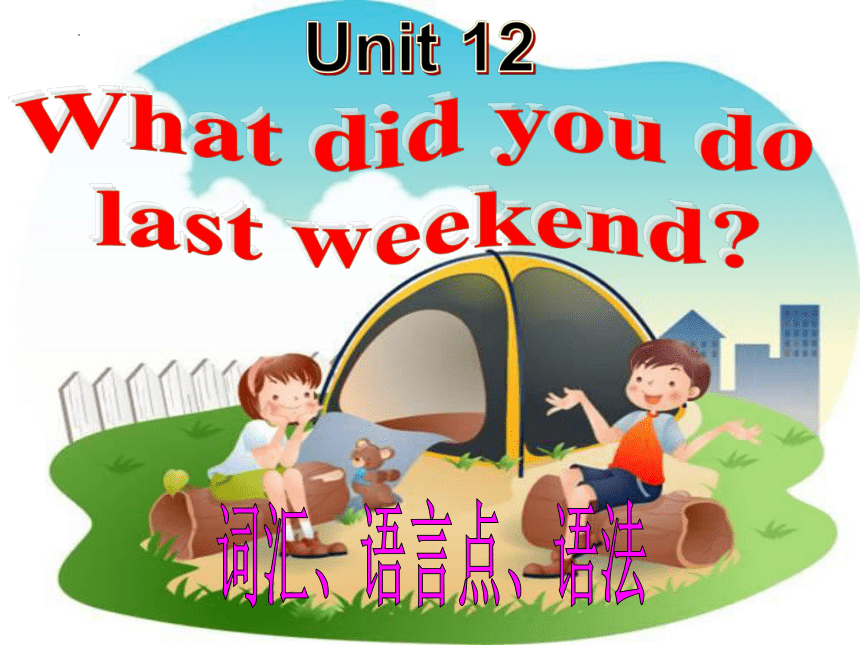
|
|
| 格式 | zip | ||
| 文件大小 | 819.3KB | ||
| 资源类型 | 教案 | ||
| 版本资源 | 人教新目标(Go for it)版 | ||
| 科目 | 英语 | ||
| 更新时间 | 2022-03-27 00:00:00 | ||
图片预览


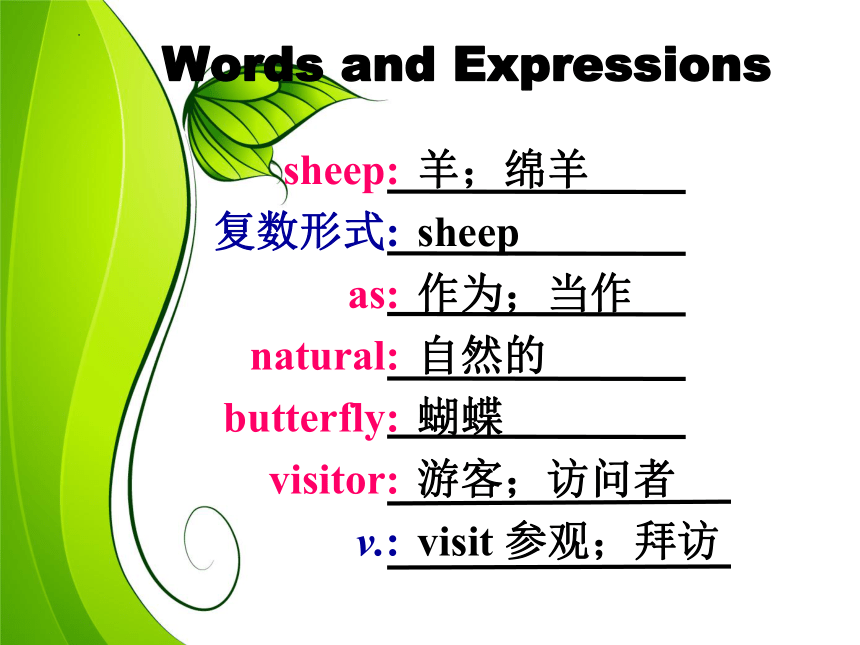
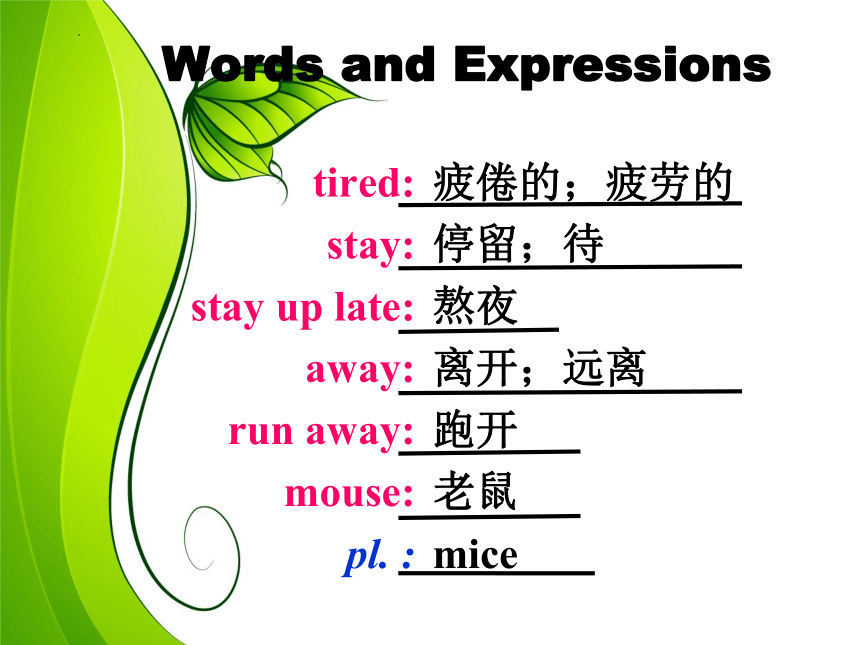
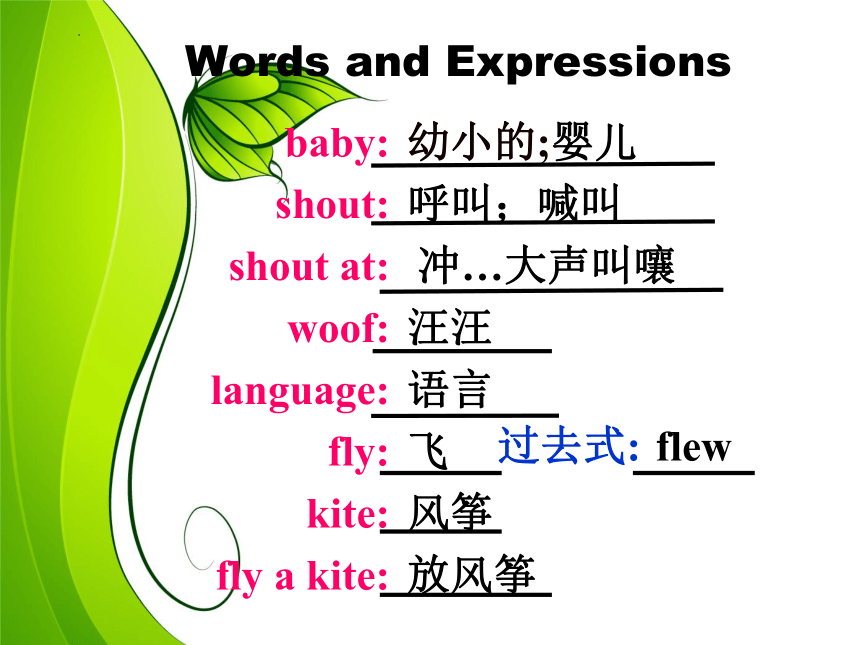
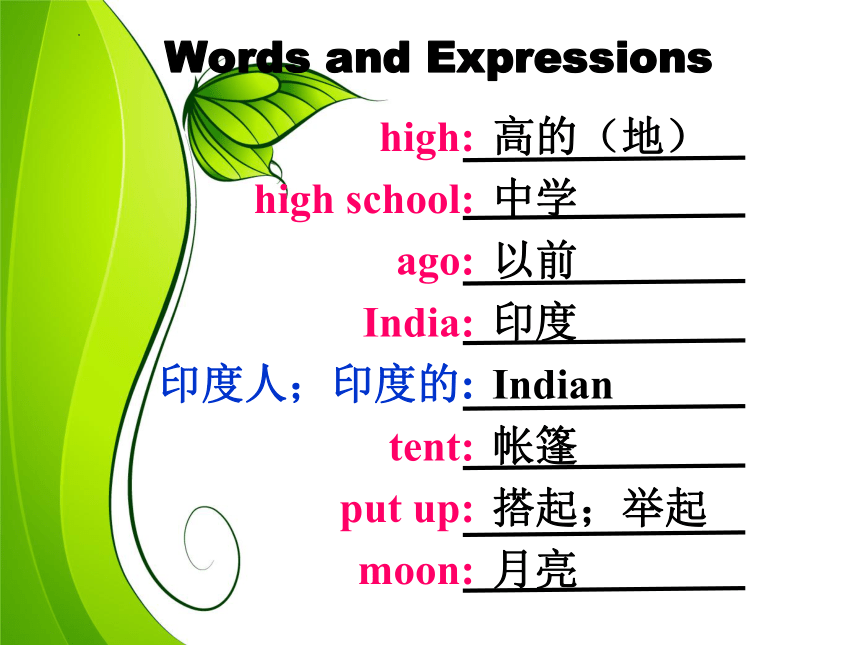
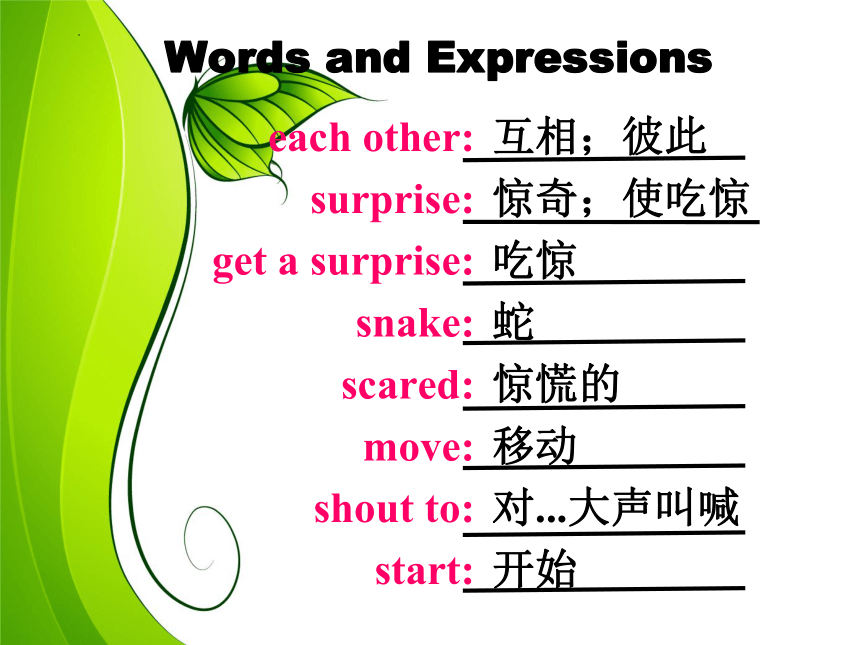
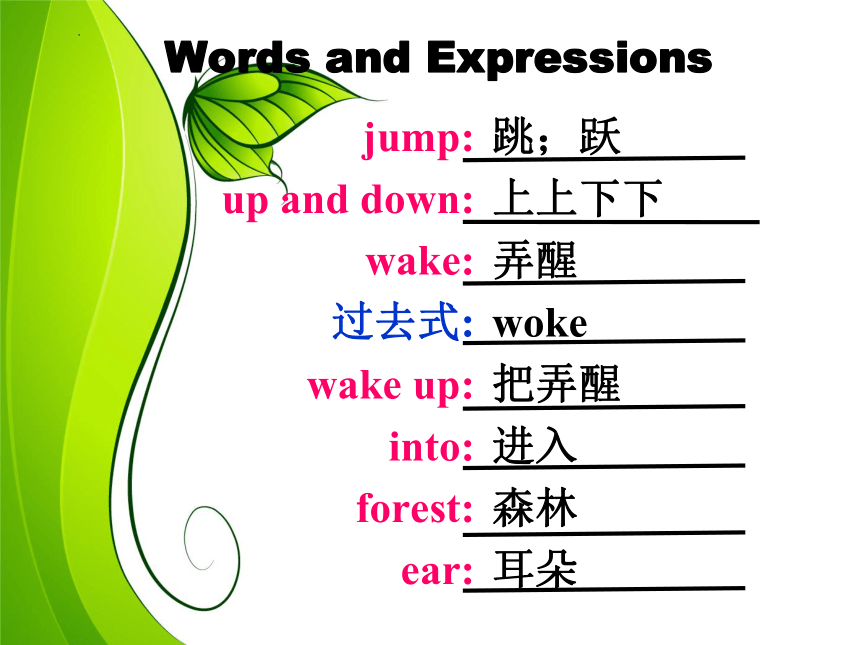
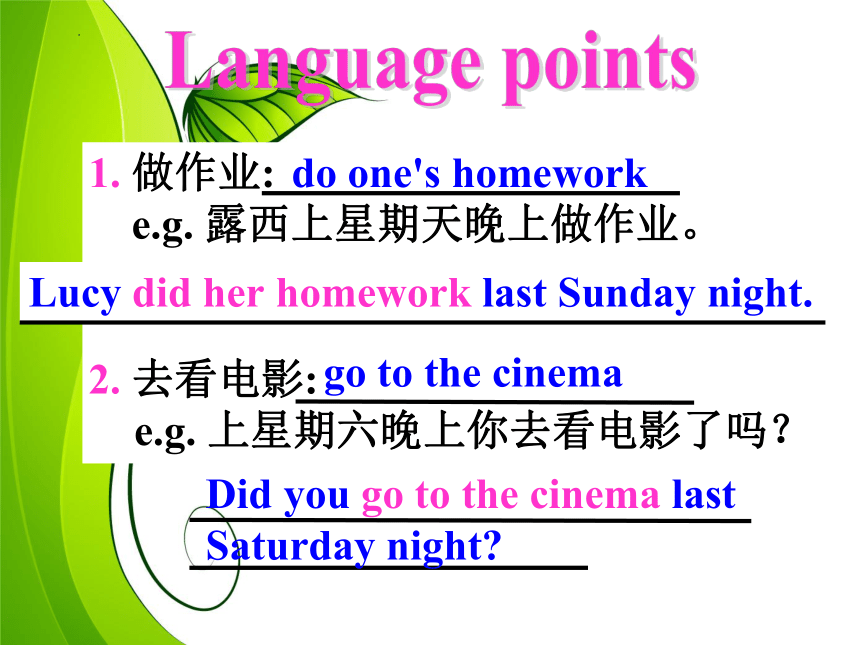
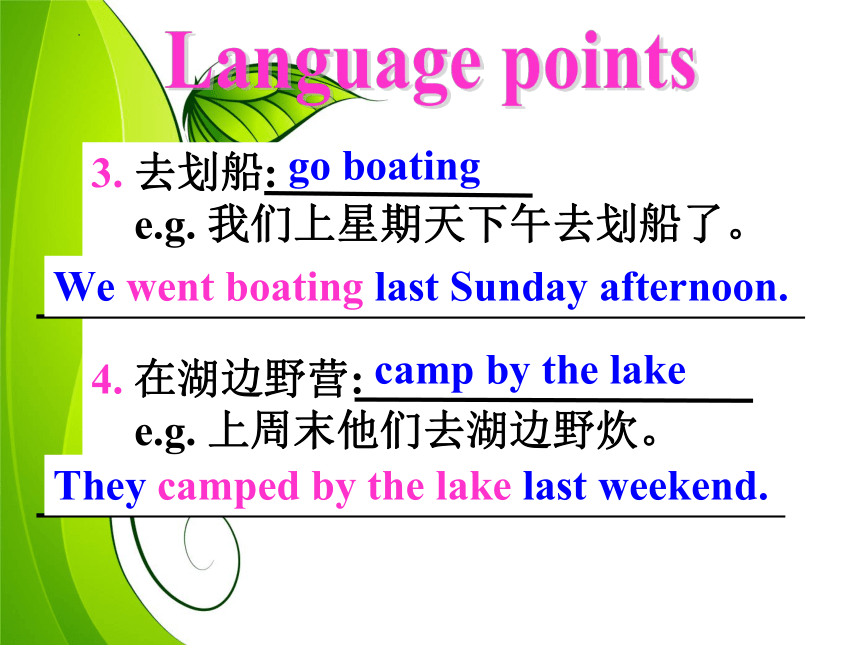
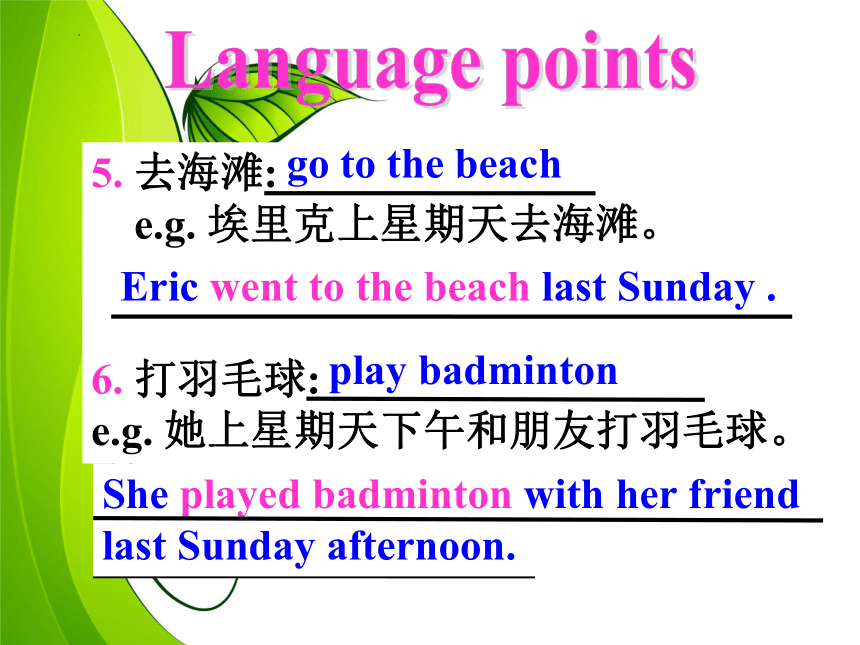

文档简介
(共65张PPT)
What did you do
last weekend
Unit 12
词汇、语言点、语法
Words and Expressions
camp:
lake:
beach:
badminton:
扎营;搭帐篷
湖;湖泊
海滩;沙滩
羽毛球运动
Words and Expressions
sheep:
复数形式:
as:
natural:
butterfly:
visitor:
v.:
羊;绵羊
sheep
作为;当作
自然的
蝴蝶
游客;访问者
visit 参观;拜访
Words and Expressions
tired:
stay:
stay up late:
away:
run away:
mouse:
pl. :
疲倦的;疲劳的
停留;待
熬夜
离开;远离
跑开
老鼠
mice
Words and Expressions
baby:
shout:
shout at:
woof:
language:
fly:
kite:
fly a kite:
幼小的;婴儿
呼叫;喊叫
冲…大声叫嚷
汪汪
语言
飞
风筝
放风筝
过去式:
flew
Words and Expressions
high:
high school:
ago:
India:
印度人;印度的:
tent:
put up:
moon:
高的(地)
中学
以前
印度
Indian
帐篷
搭起;举起
月亮
Words and Expressions
each other:
surprise:
get a surprise:
snake:
scared:
move:
shout to:
start:
互相;彼此
惊奇;使吃惊
吃惊
蛇
惊慌的
移动
对...大声叫喊
开始
Words and Expressions
jump:
up and down:
wake:
过去式:
wake up:
into:
forest:
ear:
跳;跃
上上下下
弄醒
woke
把弄醒
进入
森林
耳朵
1. 做作业:
e.g. 露西上星期天晚上做作业。
2. 去看电影:
e.g. 上星期六晚上你去看电影了吗?
do one's homework
go to the cinema
Language points
Lucy did her homework last Sunday night.
Did you go to the cinema last
Saturday night
3. 去划船:
e.g. 我们上星期天下午去划船了。
4. 在湖边野营:
e.g. 上周末他们去湖边野炊。
go boating
camp by the lake
Language points
We went boating last Sunday afternoon.
They camped by the lake last weekend.
5. 去海滩:
e.g. 埃里克上星期天去海滩。
6. 打羽毛球:
e.g. 她上星期天下午和朋友打羽毛球。
Language points
go to the beach
play badminton
Eric went to the beach last Sunday .
She played badminton with her friend last Sunday afternoon.
7. 为而学习:
8. sheep 名词,绵羊。它是单复数同
形的单词,类似的单词还有deer
(鹿), Chinese (中国人)等。
9. the Natuaral History Museum:
study for
Language points
自然历史博物馆
10. work as + 职业: 做某工作
e.g. 埃里克在那家俱乐部里做音乐老
师的工作。
11. kinds of:
Eric works as a music teacher in the club.
Language points
种类;各种各样的
12. 生活习惯:
13. 有点:
14. 熬夜;深夜不眠:
e.g. 咱们别睡觉,迎接新年的到来吧。
Language points
living habits
kind of
Let’s stay up late to see the New Year.
stay up late
15. shout at:
后面要跟人或事物。
e.g. 不要朝孩子们大声喊叫。
16. 跑开:
Language points
冲......大声叫嚷
Don’t shout at the children.
run away
17. language: 是可数名词。
e.g. 英语、汉语、法语是三种不同的语
言。
Language points
语言
English, Chinese and French are
three different languages.
18. 弹吉他:
19. 去图书馆:
20. 放风筝:
21. 吃晚餐:
22. 游泳池:
Language points
play the guitar
go to the library
fly a kite
have dinner
a swimming pool
23. high school:
24. 一段时间 + ago:意思是 “多长时间之前”,是表达过去的时间。常与一般过去时态连用。
e.g. 三天以前:
一年以前:
one year ago
Language points
中学
three days ago
25. 搭起;举起:
e.g. 让我们将帐篷搭起来吧。
26. 句式结构“so + 形容词 + that句
子 … ”:
e.g. 他如此忙以至于没有吃午饭。
Language points
put up
Let’s put up the tent.
如此…以至于…
He was so busy that he didn’t have lunch.
27. 生火:
28. 彼此;互相:
29. 吃惊:
30. 向...外看:
31. see/watch/feel/hear sb. doing sth. :
Language points
make a fire
each other
get a surprise
look out of
看到/观察到/觉得/听到某人在做某事
32. 上上下下:
33. 把...弄醒:
后面可以跟名词或代词; 跟名词时可以放在后面或中间; 但是如果跟代词的话应放于中间。
Language points
up and down
wake up
34. start:
常用结构为start/ to do sth.和start doing sth. (开始做某事)。
e.g. 我五点半开始做作业的。
Language points
开始;着手
I started to do / doing my
homework at 5:30.
35. It’s important (not) to do sth.:
36. as 表示“作为…; 当作…”,其
后可以接职业,用途,特点等。
e.g. 作为一名工人,我必须努力工作。
___________, I must work hard.
As a worker
Language points
(不要)做某事很重要。
37. a very useful lesson:
38. anything interesting:
形容词修饰不定代词放在其后。
39. 在月光下:
一次很有用的教训(课)
under the moon
任何有趣的事情
Language points
40. 玩游戏:
41. 进行体育活动:
42. 呆在家:
43. 拜访朋友:
44. 做晚餐:
45. 有点累:
play computer games
stay at home
play sports
Language points
visit friends
cook dinner
kind of tired
make dinner
Read the sentences in “Grammar Focus” box. Can you find the Grammatical pattern
1. Simple past tense(Ⅱ)
2. What/Who/How questions;
Grammar Focus
用法:
1. 表示过去某个时间发生的
动作或存在的状态。
2. 表示过去经常或反复发生
的动作。
Simple past tense (Ⅱ)一般过去时
常用时间:
yesterday, in 1990, last night
/week/ time…, … days ago
on Sunday morning…
Grammar Focus
构成:
(1) be动词过去式的句式
肯定句式: 主语+was/were+其他
e.g. 两年前我是一名学生。
I was a student two years ago.
否定句式: 在was和were后面加not
e.g. 昨天他们没在家。
They weren’t at home yesterday.
Grammar Focus
一般疑问句式: 把was/were提前放到
句首, 首字母大写。
e.g. 昨天下午你忙吗
Were you busy yesterday afternoon
(2)实义动词过去式的句式
肯定式:主语+动词过去式+其他
e.g. 昨天他们过得很开心。
They had a good time yesterday.
Grammar Focus
否定式: 主语+did not(didn’t)+动词
原形+其他;
e.g. 昨天晚上他们没看电视。
They didn’t watch TV last night.
一般疑问句: Did +主语+动词原形+其
他
肯定回答: Yes, 主语+did.
否定回答: No, 主语+didn’t.
Grammar Focus
e.g. —昨天你去看电影了吗
—我去了。/不,我没去。
—Did you go to the movies
yesterday
—Yes, I did. /No, I didn’t.
Grammar Focus
特殊疑问句: 疑问词+did+主语+动
词原形+其他
e.g. 你几点完成的作业
What time did you finish your
homework
Grammar Focus
动词过去式的构成:
1. work—worked, look—looked
2. live—lived, use—used
直接加 ed;
以不发音的e结尾的单词,直接加d;
Grammar Focus
3. study—studied, worry—worried
4. enjoy—enjoyed, play—played
以辅音字母+y结尾的单词,变y为i加ed;
以元音字母+y结尾的,直接加ed;
Grammar Focus
5. stop—stopped, plan—planned
6. have—had, are—were
get—got, do/does—did
以重读闭音节结尾的,双写最后的辅音字母加ed;
不规则变化的动词过去式。
Grammar Focus
巧记一般过去时
动词一般过去时,表示过去发生事;
be用was或用were, have, has变had;
谓语动词过去式,过去时间坐标志;
一般动词加-ed,若是特殊得硬记。
否定句很简单,主语之后didn’t添;
疑问句也不难,did放在主语前;
如果谓语之前有did,谓语动词需还原;
动词若是was, were,否定就把not添。
Grammar Focus
Mr. Jones went to the mountains for a holiday. He ________ to the train station and ____ on the train on Sunday morning.
walked
got
选择恰当的单词,并用其正确形式填空。
say look get walk ask have
I Can Do
He ____ a new hat. He often put his head out of the window to _____ at the mountains. But the wind pulled his hat off. He quickly threw his old bag out of the window. Some people ______ “Why ”. He ____, “There’s no name and address on my hat, but there’s my name and address on my bag.”
look
had
asked
said
I Can Do
1. There are over 200 kinds of _________
(butterfly) in the butterfly house.
2. It is very tiring to look after two
________ (baby).
3. Two ______ (mouse) are fighting in the
kitchen.
I Can Do
用所给单词的适当形式填空
butterflies
babies
mice
4. There were so many _________ (visit)
in the museum yesterday.
5. On Saturday morning, I _____ (fly) a
kite with my friends.It was interesting.
6. They went _________ (camp) last
weekend.
I Can Do
flew
visitors
flew
7. I was very _________ (surprise) at the
news.
8. He is much too ______ (tire) after
hard work.
9. He ______ (wake) up at 5:00 this
morning.
I Can Do
tired
surprised
woke
1. Peter, do you know who is the first
man to walk on _____ moon
A. a B. an C. the D. /
I Can Do
C
单项选择
2. Mr. Black worked _____ a guide in
Canada two years ago.
A. for B. as C. of D. about
3. Look!These _____ are playing
near the apple tree.
A. sheep B. cow
C. horse D. chicken
B
A
I Can Do
4.—_____ was your weekend, Mary
—It was very good.
A. How B. Where C. Who D. What
5. Mary is tired today because she _____
late to watch a movie last night.
A. set up B. put up
C. got up D. stayed up
A
D
I Can Do
6. He is a _____ from England and he
_____ this place every year.
A. visitor; visits B. visitor; visited
C. visited; visits D. visited; visited
7. I came here _____ the morning of
June 20th.
A. in B. on C. at D. with
A
B
I Can Do
8. My aunt started _____ the kitchen at
2:00 pm.
A. to cleaning B. cleaned
C. clean D. to clean
A
I Can Do
9.—_____
—I went to see my friend.
A. Where was your friend
B. What are you doing
C. How's your friend
D. What did you do
D
I Can Do
10.—I think it's useful _____ a second
language.
—Me too.
A. learn B. to learn
C. learning D. to learning
B
I Can Do
11.—Mr. Yang lost her mother in an
accident yesterday.
—_____.
A. That's too bad
B. Glad to hear that
C. Good idea
D. Have a good time
A
I Can Do
12.—Where did you go for vacation
—_____.
A. To the beach
B. Last weekend
C. We enjoyed it a lot
D. It was a great trip
A
I Can Do
13. I saw some fish _____ in the lake
when I walked by it.
A. swim B. to swim
C. swimming D. to swimming
14. Huangguoshu Waterfall is _____
beautiful that I want to come here
again next year.
A. so B. too C. such D. /
A
C
15.— What did they do last weekend
— They _____ in the park.
A. went a boat B. went to a boat
C. went boating D. took boating
16.—Who cleaned the room
— Li Lei _____.
A. was B. did C. is D. had
C
I Can Do
B
17. Jenny often _____ to school early,
but this morning she _____ to
school late.
A. go; went B. went; goes
C. goes; went D. goes; goes
C
I Can Do
18. I finished middle school _____.
A. tomorrow
B. in three years
C. before three years
D. three years ago
D
I Can Do
Last Sunday, it was fine. I went camping in a __1__ with my parents. It was __2__ a good place to relax. The air in the forest was __3__. There were different kinds of flowers and I __4__ some butterflies flying among(在……中) the flowers. We __5__ a tent under
I Can Do
B
完形填空
A
C
B
D
a tree. Then my parents took a walk in the forest. I'm interested __6__ painting, so I sat on the grass(草地) and started to __7__. I wanted to record(记录) the happy time.
At lunchtime, we made a __8__ to cook food. My mother __9__ rice and
I Can Do
A
C
A
D
beef soup for us. The food was delicious. After lunch, my father __10__ chess with me. My mother read a book about animals. We had a great time. Oh, I want to go camping there again.
1. A. village B. forest
C. school D. town
I Can Do
C
2. A. really B. too C. very D. only
3. A. dry B. new C. clean D. cold
4. A. felt B. saw
C. heard D. tasted
5. A. cut down B. cut up
C. blew out D. put up
I Can Do
6. A. in B. on C. with D. at
7. A. read B. sing C. draw D. eat
8. A. fire B. bowl C. kitchen D. dish
9. A. bought B. brought
C. ordered D. made
10. A. plays B. will play
C. played D. play
I Can Do
It was the last day of the winter vacation. ____ He wanted to go to school early the next morning, because he couldn't wait to see his teachers and classmates. The next morning, Li Ming
I Can Do
E
根据短文内容,从方框中选出能填入空白
处的最佳选项。选项中有两项为多余选项。
got up at 6:30. He looked out of the window. It was white everywhere(到处). ____“Wow, how beautiful!” said Li Ming.There were many trees in front of his house. ____ He went out of his house and was going to school.
____ There was much snow on the
I Can Do
B
G
D
street. He decided(决定) to walk to school. Twenty minutes later, Li Ming got to school.Some teachers and students were cleaning the snow outside the classroom. ____ He was tired, but he felt happy on the first day back to school.
I Can Do
A
A. Li Ming did it, too.
B. It snowed last night.
C. Li Ming didn't like that.
D. How did Li Ming go to school.
I Can Do
E. Li Ming went to bed early in the
evening.
F. Li Ming's parents asked him to
have breakfast.
G. They were really beautiful with
the white snow.
I Can Do
Thank you!
Ninety-nine percent of the failures
come from people who have
the habit of making excuses.
百分之九十九的失败
都是由习惯找借口的人造成的。
What did you do
last weekend
Unit 12
词汇、语言点、语法
Words and Expressions
camp:
lake:
beach:
badminton:
扎营;搭帐篷
湖;湖泊
海滩;沙滩
羽毛球运动
Words and Expressions
sheep:
复数形式:
as:
natural:
butterfly:
visitor:
v.:
羊;绵羊
sheep
作为;当作
自然的
蝴蝶
游客;访问者
visit 参观;拜访
Words and Expressions
tired:
stay:
stay up late:
away:
run away:
mouse:
pl. :
疲倦的;疲劳的
停留;待
熬夜
离开;远离
跑开
老鼠
mice
Words and Expressions
baby:
shout:
shout at:
woof:
language:
fly:
kite:
fly a kite:
幼小的;婴儿
呼叫;喊叫
冲…大声叫嚷
汪汪
语言
飞
风筝
放风筝
过去式:
flew
Words and Expressions
high:
high school:
ago:
India:
印度人;印度的:
tent:
put up:
moon:
高的(地)
中学
以前
印度
Indian
帐篷
搭起;举起
月亮
Words and Expressions
each other:
surprise:
get a surprise:
snake:
scared:
move:
shout to:
start:
互相;彼此
惊奇;使吃惊
吃惊
蛇
惊慌的
移动
对...大声叫喊
开始
Words and Expressions
jump:
up and down:
wake:
过去式:
wake up:
into:
forest:
ear:
跳;跃
上上下下
弄醒
woke
把弄醒
进入
森林
耳朵
1. 做作业:
e.g. 露西上星期天晚上做作业。
2. 去看电影:
e.g. 上星期六晚上你去看电影了吗?
do one's homework
go to the cinema
Language points
Lucy did her homework last Sunday night.
Did you go to the cinema last
Saturday night
3. 去划船:
e.g. 我们上星期天下午去划船了。
4. 在湖边野营:
e.g. 上周末他们去湖边野炊。
go boating
camp by the lake
Language points
We went boating last Sunday afternoon.
They camped by the lake last weekend.
5. 去海滩:
e.g. 埃里克上星期天去海滩。
6. 打羽毛球:
e.g. 她上星期天下午和朋友打羽毛球。
Language points
go to the beach
play badminton
Eric went to the beach last Sunday .
She played badminton with her friend last Sunday afternoon.
7. 为而学习:
8. sheep 名词,绵羊。它是单复数同
形的单词,类似的单词还有deer
(鹿), Chinese (中国人)等。
9. the Natuaral History Museum:
study for
Language points
自然历史博物馆
10. work as + 职业: 做某工作
e.g. 埃里克在那家俱乐部里做音乐老
师的工作。
11. kinds of:
Eric works as a music teacher in the club.
Language points
种类;各种各样的
12. 生活习惯:
13. 有点:
14. 熬夜;深夜不眠:
e.g. 咱们别睡觉,迎接新年的到来吧。
Language points
living habits
kind of
Let’s stay up late to see the New Year.
stay up late
15. shout at:
后面要跟人或事物。
e.g. 不要朝孩子们大声喊叫。
16. 跑开:
Language points
冲......大声叫嚷
Don’t shout at the children.
run away
17. language: 是可数名词。
e.g. 英语、汉语、法语是三种不同的语
言。
Language points
语言
English, Chinese and French are
three different languages.
18. 弹吉他:
19. 去图书馆:
20. 放风筝:
21. 吃晚餐:
22. 游泳池:
Language points
play the guitar
go to the library
fly a kite
have dinner
a swimming pool
23. high school:
24. 一段时间 + ago:意思是 “多长时间之前”,是表达过去的时间。常与一般过去时态连用。
e.g. 三天以前:
一年以前:
one year ago
Language points
中学
three days ago
25. 搭起;举起:
e.g. 让我们将帐篷搭起来吧。
26. 句式结构“so + 形容词 + that句
子 … ”:
e.g. 他如此忙以至于没有吃午饭。
Language points
put up
Let’s put up the tent.
如此…以至于…
He was so busy that he didn’t have lunch.
27. 生火:
28. 彼此;互相:
29. 吃惊:
30. 向...外看:
31. see/watch/feel/hear sb. doing sth. :
Language points
make a fire
each other
get a surprise
look out of
看到/观察到/觉得/听到某人在做某事
32. 上上下下:
33. 把...弄醒:
后面可以跟名词或代词; 跟名词时可以放在后面或中间; 但是如果跟代词的话应放于中间。
Language points
up and down
wake up
34. start:
常用结构为start/ to do sth.和start doing sth. (开始做某事)。
e.g. 我五点半开始做作业的。
Language points
开始;着手
I started to do / doing my
homework at 5:30.
35. It’s important (not) to do sth.:
36. as 表示“作为…; 当作…”,其
后可以接职业,用途,特点等。
e.g. 作为一名工人,我必须努力工作。
___________, I must work hard.
As a worker
Language points
(不要)做某事很重要。
37. a very useful lesson:
38. anything interesting:
形容词修饰不定代词放在其后。
39. 在月光下:
一次很有用的教训(课)
under the moon
任何有趣的事情
Language points
40. 玩游戏:
41. 进行体育活动:
42. 呆在家:
43. 拜访朋友:
44. 做晚餐:
45. 有点累:
play computer games
stay at home
play sports
Language points
visit friends
cook dinner
kind of tired
make dinner
Read the sentences in “Grammar Focus” box. Can you find the Grammatical pattern
1. Simple past tense(Ⅱ)
2. What/Who/How questions;
Grammar Focus
用法:
1. 表示过去某个时间发生的
动作或存在的状态。
2. 表示过去经常或反复发生
的动作。
Simple past tense (Ⅱ)一般过去时
常用时间:
yesterday, in 1990, last night
/week/ time…, … days ago
on Sunday morning…
Grammar Focus
构成:
(1) be动词过去式的句式
肯定句式: 主语+was/were+其他
e.g. 两年前我是一名学生。
I was a student two years ago.
否定句式: 在was和were后面加not
e.g. 昨天他们没在家。
They weren’t at home yesterday.
Grammar Focus
一般疑问句式: 把was/were提前放到
句首, 首字母大写。
e.g. 昨天下午你忙吗
Were you busy yesterday afternoon
(2)实义动词过去式的句式
肯定式:主语+动词过去式+其他
e.g. 昨天他们过得很开心。
They had a good time yesterday.
Grammar Focus
否定式: 主语+did not(didn’t)+动词
原形+其他;
e.g. 昨天晚上他们没看电视。
They didn’t watch TV last night.
一般疑问句: Did +主语+动词原形+其
他
肯定回答: Yes, 主语+did.
否定回答: No, 主语+didn’t.
Grammar Focus
e.g. —昨天你去看电影了吗
—我去了。/不,我没去。
—Did you go to the movies
yesterday
—Yes, I did. /No, I didn’t.
Grammar Focus
特殊疑问句: 疑问词+did+主语+动
词原形+其他
e.g. 你几点完成的作业
What time did you finish your
homework
Grammar Focus
动词过去式的构成:
1. work—worked, look—looked
2. live—lived, use—used
直接加 ed;
以不发音的e结尾的单词,直接加d;
Grammar Focus
3. study—studied, worry—worried
4. enjoy—enjoyed, play—played
以辅音字母+y结尾的单词,变y为i加ed;
以元音字母+y结尾的,直接加ed;
Grammar Focus
5. stop—stopped, plan—planned
6. have—had, are—were
get—got, do/does—did
以重读闭音节结尾的,双写最后的辅音字母加ed;
不规则变化的动词过去式。
Grammar Focus
巧记一般过去时
动词一般过去时,表示过去发生事;
be用was或用were, have, has变had;
谓语动词过去式,过去时间坐标志;
一般动词加-ed,若是特殊得硬记。
否定句很简单,主语之后didn’t添;
疑问句也不难,did放在主语前;
如果谓语之前有did,谓语动词需还原;
动词若是was, were,否定就把not添。
Grammar Focus
Mr. Jones went to the mountains for a holiday. He ________ to the train station and ____ on the train on Sunday morning.
walked
got
选择恰当的单词,并用其正确形式填空。
say look get walk ask have
I Can Do
He ____ a new hat. He often put his head out of the window to _____ at the mountains. But the wind pulled his hat off. He quickly threw his old bag out of the window. Some people ______ “Why ”. He ____, “There’s no name and address on my hat, but there’s my name and address on my bag.”
look
had
asked
said
I Can Do
1. There are over 200 kinds of _________
(butterfly) in the butterfly house.
2. It is very tiring to look after two
________ (baby).
3. Two ______ (mouse) are fighting in the
kitchen.
I Can Do
用所给单词的适当形式填空
butterflies
babies
mice
4. There were so many _________ (visit)
in the museum yesterday.
5. On Saturday morning, I _____ (fly) a
kite with my friends.It was interesting.
6. They went _________ (camp) last
weekend.
I Can Do
flew
visitors
flew
7. I was very _________ (surprise) at the
news.
8. He is much too ______ (tire) after
hard work.
9. He ______ (wake) up at 5:00 this
morning.
I Can Do
tired
surprised
woke
1. Peter, do you know who is the first
man to walk on _____ moon
A. a B. an C. the D. /
I Can Do
C
单项选择
2. Mr. Black worked _____ a guide in
Canada two years ago.
A. for B. as C. of D. about
3. Look!These _____ are playing
near the apple tree.
A. sheep B. cow
C. horse D. chicken
B
A
I Can Do
4.—_____ was your weekend, Mary
—It was very good.
A. How B. Where C. Who D. What
5. Mary is tired today because she _____
late to watch a movie last night.
A. set up B. put up
C. got up D. stayed up
A
D
I Can Do
6. He is a _____ from England and he
_____ this place every year.
A. visitor; visits B. visitor; visited
C. visited; visits D. visited; visited
7. I came here _____ the morning of
June 20th.
A. in B. on C. at D. with
A
B
I Can Do
8. My aunt started _____ the kitchen at
2:00 pm.
A. to cleaning B. cleaned
C. clean D. to clean
A
I Can Do
9.—_____
—I went to see my friend.
A. Where was your friend
B. What are you doing
C. How's your friend
D. What did you do
D
I Can Do
10.—I think it's useful _____ a second
language.
—Me too.
A. learn B. to learn
C. learning D. to learning
B
I Can Do
11.—Mr. Yang lost her mother in an
accident yesterday.
—_____.
A. That's too bad
B. Glad to hear that
C. Good idea
D. Have a good time
A
I Can Do
12.—Where did you go for vacation
—_____.
A. To the beach
B. Last weekend
C. We enjoyed it a lot
D. It was a great trip
A
I Can Do
13. I saw some fish _____ in the lake
when I walked by it.
A. swim B. to swim
C. swimming D. to swimming
14. Huangguoshu Waterfall is _____
beautiful that I want to come here
again next year.
A. so B. too C. such D. /
A
C
15.— What did they do last weekend
— They _____ in the park.
A. went a boat B. went to a boat
C. went boating D. took boating
16.—Who cleaned the room
— Li Lei _____.
A. was B. did C. is D. had
C
I Can Do
B
17. Jenny often _____ to school early,
but this morning she _____ to
school late.
A. go; went B. went; goes
C. goes; went D. goes; goes
C
I Can Do
18. I finished middle school _____.
A. tomorrow
B. in three years
C. before three years
D. three years ago
D
I Can Do
Last Sunday, it was fine. I went camping in a __1__ with my parents. It was __2__ a good place to relax. The air in the forest was __3__. There were different kinds of flowers and I __4__ some butterflies flying among(在……中) the flowers. We __5__ a tent under
I Can Do
B
完形填空
A
C
B
D
a tree. Then my parents took a walk in the forest. I'm interested __6__ painting, so I sat on the grass(草地) and started to __7__. I wanted to record(记录) the happy time.
At lunchtime, we made a __8__ to cook food. My mother __9__ rice and
I Can Do
A
C
A
D
beef soup for us. The food was delicious. After lunch, my father __10__ chess with me. My mother read a book about animals. We had a great time. Oh, I want to go camping there again.
1. A. village B. forest
C. school D. town
I Can Do
C
2. A. really B. too C. very D. only
3. A. dry B. new C. clean D. cold
4. A. felt B. saw
C. heard D. tasted
5. A. cut down B. cut up
C. blew out D. put up
I Can Do
6. A. in B. on C. with D. at
7. A. read B. sing C. draw D. eat
8. A. fire B. bowl C. kitchen D. dish
9. A. bought B. brought
C. ordered D. made
10. A. plays B. will play
C. played D. play
I Can Do
It was the last day of the winter vacation. ____ He wanted to go to school early the next morning, because he couldn't wait to see his teachers and classmates. The next morning, Li Ming
I Can Do
E
根据短文内容,从方框中选出能填入空白
处的最佳选项。选项中有两项为多余选项。
got up at 6:30. He looked out of the window. It was white everywhere(到处). ____“Wow, how beautiful!” said Li Ming.There were many trees in front of his house. ____ He went out of his house and was going to school.
____ There was much snow on the
I Can Do
B
G
D
street. He decided(决定) to walk to school. Twenty minutes later, Li Ming got to school.Some teachers and students were cleaning the snow outside the classroom. ____ He was tired, but he felt happy on the first day back to school.
I Can Do
A
A. Li Ming did it, too.
B. It snowed last night.
C. Li Ming didn't like that.
D. How did Li Ming go to school.
I Can Do
E. Li Ming went to bed early in the
evening.
F. Li Ming's parents asked him to
have breakfast.
G. They were really beautiful with
the white snow.
I Can Do
Thank you!
Ninety-nine percent of the failures
come from people who have
the habit of making excuses.
百分之九十九的失败
都是由习惯找借口的人造成的。
同课章节目录
- Unit 1 Can you play the guitar?
- Section A
- Section B
- Unit 2 What time do you go to school?
- Section A
- Section B
- Unit 3 How do you get to school?
- Section A
- Section B
- Unit 4 Don't eat in class.
- Section A
- Section B
- Unit 5 Why do you like pandas?
- Section A
- Section B
- Unit 6 I'm watching TV.
- Section A
- Section B
- Review of Units 1-6
- Unit 7 It's raining!
- Section A
- Section B
- Unit 8 Is there a post office near here?
- Section A
- Section B
- Unit 9 What does he look like?
- Section A
- Section B
- Unit 10 I'd like some noodles.
- Section A
- Section B
- Unit 11 How was your school trip?
- Section A
- Section B
- Unit 12 What did you do last weekend?
- Section A
- Section B
